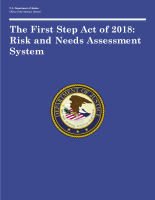Risk management
Adam Walsh Act: An Examination of Sex Offender Risk Classification Systems
An Impact Assessment of Machine Learning Risk Forecasts on Parole Board Decisions and Recidivism
How do Varied Populations Interact with Embodied Conversational Agents? Findings From Inner-City Adolescents and Prisoners
Pennsylvania Models a Streamlined Approach to Inmate Management
Offender Tracking System Standard Nears Completion
Homeland Security Risk and Preparedness in Police Agencies: The Insignificance of Actual Risk Factors
Residential Treatment Home for Developmentally Disabled Sex Offenders: One Community's Response (From Managing Adult Sex Offenders: A Containment Approach, P 16.1-16.15, 1996, Kim English, Suzanne Pullen, and Linda Jones, eds. - See NCJ-162392)
Importance of Risk Assessments to Positive Outcomes for Youth - Juvenile Justice Research Spotlight
Evaluating the Impact of Probation and Parole Home Visits
Developing, Implementing, and Evaluating a Police Fatigue Risk-Management Strategy for the Seattle Police Department
Solutions in Corrections: Using Evidence-based Knowledge
Professor Ed Latessa describes how his team and he assessed more than 550 programs and saw the best and the worst. Professor Latessa shared his lessons learned and examples of states that are trying to use evidence-based knowledge to improve correctional programs.
See the YouTube Terms of Service and Google Privacy Policy
An Examination of Justice Reinvestment and Its Impact on Two States
Funded in part by the Bureau of Justice Assistance and the Pew Center on the States, the justice reinvestment project is a data-driven strategy aimed at policymakers to "reduce spending on corrections, increase public safety and improve conditions in the neighborhoods to which most people released from prison return." Representatives from two states where the justice reinvestment strategy is currently being implemented will discuss how it is being used to reduce the rate of incarceration and how states can reinvest in local communities.


